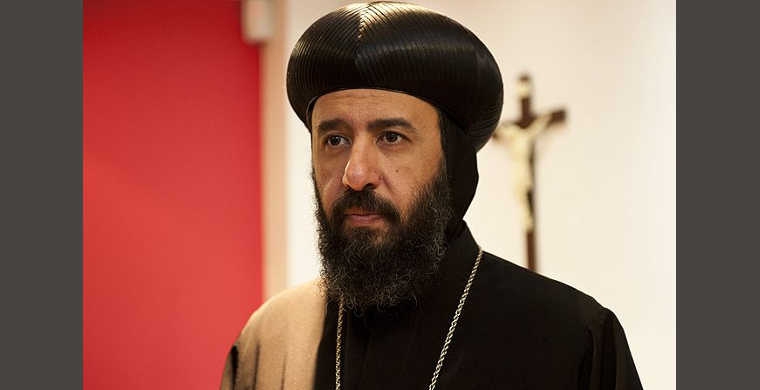Bishop Angaelos discusses his fellow Copts and other Christians in the Middle East
Andrew Harrod reports from the Hudson Institute
http://www.religiousfreedomcoalition.org/
March 28, 2015
The 2011 Arab Spring and its aftermath have "turned into somewhat of a challenge" for Middle East Christians, stated with British understatement Bishop Angaelos in a repeat appearance at Washington, DC's Hudson Institute on March 18. The General Bishop of the Coptic Orthodox Church in the United Kingdom discussed Christian resolve to remain in the Middle East in the face of Islamic violence and repression before a panel audience of about 50.
Hudson religious freedom scholar Nina Shea introduced "Prospects for Christians in the Path of Persecution" by describing the Middle East as a "region that is really becoming more inflamed every day." Angaelos saw in the region an intolerant religious "mold that is becoming smaller and smaller" under which only some people could exist. "In certain areas of Iraq there is no longer a tenable existence for Christians" he stated while discussing Muslims who betrayed their Christian neighbors before the advancing Islamic State of Iraq and Syria (ISIS).
Angaelos described how his native Egypt had narrowly avoided such fates. ISIS had declared a caliphate in 2014, something that "could easily have happened in Egypt" given the plans of the Muslim Brotherhood (MB) government that came to power in 2012. After Hosni Mubarak's 2011 overthrow, Egypt experienced a "near anarchic existence."
The collapse of police forces allowed for more attacks on Egyptian Christian churches in one year than in the previous 20, including the bulldozer destruction of a church in broad daylight. Yet Egypt's Christians spontaneously practiced forgiveness and restraint, such as when they wrote Bible verses of reconciliation on churches ruined during an August 2013 MB-coordinated attack against churches nationwide. During a long history of Islamic repression "we never as Coptic Christians have taken up arms," he noted.
His fellow Copt, Hudson's Islamism expert Samuel Tadros, elaborated upon Angaelos' comments with descriptions of past and present Muslim discrimination against Egypt's Christians. Church construction, for example, demands presidential approval, something even church renovations such as additional bathrooms required before a 2005 legal reform substituted state governor assent. Egypt's Islam-oriented blasphemy laws resulted in prosecutions for even social media Likes while one person received a three-year prison sentence for being tagged in a picture.
Christians were almost completely absent form government leadership positions, despite comprising an estimated 10% of Egypt's population. Christians were also the targets of kidnappings and mob violence prompted by infractions of Islamic norms, such as relationships between non-Muslim men and Muslim women. De facto police acquiescence in such riots allowed for effective enforcement of Islam's dhimmi "second-class citizenship" status for Christians and others.
"As Christians," Angaelos nonetheless maintained, "we see ourselves as indigenous people" in the Middle East, "very much part of the region," people who "have time and time again rejected minority status." Despite recent upsurges of violence, many Middle East Christians such as the 90% of Copts who still live in Egypt "are meaning to weather the storm." He did not, moreover, see any Middle East refuge where Egypt's 12 million Copts could flee. In past crises Christians fled from one Middle East residence to another, but today the entire region faced problems, including Lebanon where refugees were 40% of the population, a "huge burden." Tadros likewise rejected proposals for a Christian "regional safe haven" such as a future Christian state, as no one country in the region could accept all of its Christians, many of whom had no desire to abandon their homes.
The two Copts agreed that a Christian exodus would harm both Christians and the Middle East. "The fate of the Middle East Christians is very much tied to the fate of the region itself," stated Tadros. Middle East Christians are a "bridge between the East and the West," while numerous studies link religious freedom to various indices of social wellbeing, creating "strategic policy implications on so many levels." "Christians in the Middle East have a very important place," Angaelos agreed, such as serving as a "buffer" between various Muslim groups.
Seeking religious freedom solutions, Angaelos called in Egypt and elsewhere for a "pragmatic, intentional approach toward nation-building." He desired a governmental "top down agenda that every individual is valued" and people "don't care what your religion is"; governments "should show almost a blindness to faith" under the law. To this end, Tadros recommended a "carrot and stick on the local level" in countries like Egypt favoring with foreign aid local governments promoting religious tolerance.
Angaelos desired religious reform from credible Islamic institutions that would "challenge from within" Islam doctrines justifying atrocities by groups like ISIS.
He particularly noted Islam's "Mafia protection tax" or jizya levied historically as tribute from subjugated non-Muslims like Christians. For this reason, educational materials at Cairo's Al Azhar University, Sunni Islam's leading authority, required change.
Recent Egyptian events indicated the gap between Angaelos' vision and reality. Shea praised Egyptian President Abdel Fattah el-Sisi's strong reaction (including airstrikes) to the ISIS beheading of 21 Egyptian Copts in Libya as showing "Copts being taken seriously as full citizens of Egypt." Tadros, though, noted that the Egyptian "government obviously needs some form of Islamic legitimacy" while fighting the MB, resulting in atheists and Egypt's tiny Shiite minority "paying the price." The government has prosecuted them for blasphemy offenses such as alleged Shiite insults against the companions and wives of Islam's prophet Muhammad who opposed Shiites during Islam's seventh-century division.
Such adversity left Angaelos undaunted. He quoted 2 Corinthians 4:8-9 to describe Middle Eastern Christians as "hard pressed on every side, but not crushed; perplexed, but not in despair; persecuted, but not abandoned; struck down, but not destroyed." He persisted in proclaiming that Jesus' example showed that "advocacy is an intrinsic part of Christianity...part of Christian ministry is to say that every person is important," a "creation of God."
END














